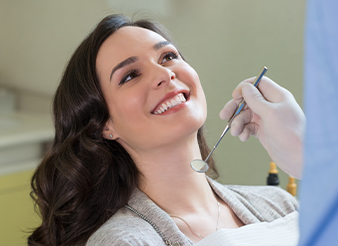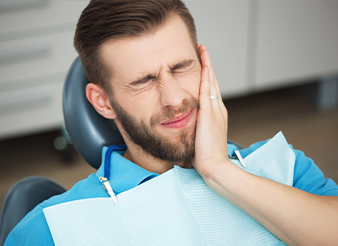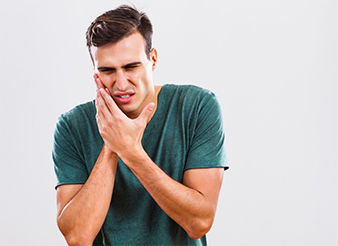Emergency Dentistry
Toothache? Accident? Come See Us!

Having a plan in place can make all the difference in a dental emergency, and you certainly don’t want to have to come up with one after your child develops a terrible toothache or you’ve damaged your own teeth in an accident. If you ever find yourself in need of urgent dental care, you only need to do one thing: call Creekview Family Dentistry. We’re happy to accept emergency patients, and we can even schedule same-day appointments so we can get someone out of pain as quickly as possible.
Why Choose Creekview Family Dentistry for Emergency Dentistry?
- Same-Day Appointments Available for Emergency Patients
- Open Early, Late, & on Saturdays
- Highly-Trained Team with Decades of Experience
How to Handle Emergencies

Whether it’s a severe toothache or broken/knocked-out tooth, the first thing you should do in any dental emergency is give us a call and head straight to our dental office. Of course, we know that life gets in the way sometimes, so if you’re unable to reach us immediately, the following tips will help you get a handle on some of the most common dental emergencies:
Toothaches
Start by rinsing and flossing around the tooth to dislodge any debris that might be causing the pain. If this doesn’t help, the problem is likely due to an infection or crack in the enamel. In this case, an OTC medication or cold compress can help provide temporary relief.
Chipped/Broken Teeth
Gently rinse the mouth with warm water to clean it, and try to recover as many pieces of the tooth that you can, putting them in a safe container. To prevent the remaining tooth from cutting the mouth, cover it with either some sugarless gum or dental wax.
Knocked-Out Tooth
Find the tooth, give it a quick rinse, and try to place it back into its socket, holding it in place by closing the mouth. Otherwise, you can keep it in a container with some milk or saltwater. You need to move fast in this situation as we can only replant a tooth within an hour or so of it being removed.
Lost Filling / Crown
Find the restoration, rinse it off with some water, and try to put it back onto the tooth. A little bit of toothpaste can help with this. Avoid chewing with the tooth until we can repair it, and if you feel any pain or sensitivity, you can take an OTC medication.
How to Prevent Dental Emergencies

Here are just a few ways you can drastically reduce your chances of needing to make a sudden, unexpected dental visit:
- Wear a mouthguard every time you play sports—up to 40% of all dental injuries are sports-related!
- Grind your teeth at night? Talk to our team about getting a protective nightguard before you crack your teeth.
- Your teeth are strong, but not indestructible, so avoid chewing on hard items like ice, popcorn kernels, pens, pencils, fingernails, etc.
- Maintain your oral hygiene at home and attend regular dental checkups so small problems can be treated before they turn into big emergencies.
Cost of Treating Emergencies

We personalize our approach with every emergency patient based on their unique needs, and because of this, there is no fixed price for urgent dental care. Our goals are to relieve pain as soon as possible before addressing any damage to the teeth. To make this type of care more affordable, we have 3 flexible payment options: we accept all insurances, offer financing, and even have our own In-House Membership Plan.
Emergency Dentistry FAQs

Accidents happen, and it’s best to be as prepared as possible in case one should strike. That’s why your emergency dentist in Lewisville has gathered this list of commonly asked questions about dental emergencies and answered them below for your convenience. If you have an emergency question that you don’t see answered here, contact our practice and ask.
What Counts as a Dental Emergency?
Since dental pain and discomfort can be fairly common, it’s difficult to deduce whether it’s truly an emergency situation sometimes. You might have a dental emergency if you’re experiences signs like:
- Intense pain
- Bleeding
- Broken or loose teeth
- Bleeding
- Swelling
- Knocked-out teeth
- Sores that won’t go away
- Loose fillings or crowns
Most dental emergencies come in one of two categories: sudden trauma to the mouth and infection that builds over time, usually as a result of poor oral hygiene. At Creekview Family Dentistry, we are more than prepared to handle both!
When Should I Go to the ER Instead of the Dentist?
If your dental emergency is also life-threatening, you should definitely visit your local hospital instead of your dentist in Lewisville. If you have a problem like swelling that impacts your breathing, jaw fractures or dislocations, or severe lacerations, then absolutely go to the ER.
Will My Insurance Cover Dental Emergencies?
Since every dental emergency, every treatment, and every insurance plan is different, it’s nearly impossible to estimate your coverage. Your plan might cover the majority of some restorative procedures like fillings, and only a small portion of major treatments like tooth replacements. If you come into our practice for an emergency evaluation, our team will work with you to maximize your benefits and minimize the amount you’ll end up paying out of pocket.
What If I Bite My Lip or Tongue?
Assess the area to make sure there is no debris. Use a clean piece of gauze or cloth to clean the site, and apply pressure if there’s bleeding. To cut down on potential swelling, apply a cold compress to the area for 10 minutes on, 10 minutes off. Call our office as soon as you can and we’ll most likely be able to treat you.
What If My Child’s Baby Tooth Gets Knocked Out?
Whatever you do, do NOT attempt to place a baby tooth back in the socket like you would for a dislodged permanent tooth. Doing so could damage the underlying adult tooth. Instead, place the tooth in a container of milk until you can get to our office. Depending on how close the tooth was to falling out naturally, we may or may not put a space maintainer in the gap to prevent the surrounding teeth from drifting into the space.
I Need a Checkup & Cleaning I Have a Cavity or Broken Tooth I am Missing 1 or More Teeth I Want to Improve My Smile I Would like a Straighter Smile I am Anxious & Afraid I am Worried About Bleeding Gums I am Experiencing Head, Neck, or Jaw Pain I Want to Learn about Sleep Apnea View Our Services
